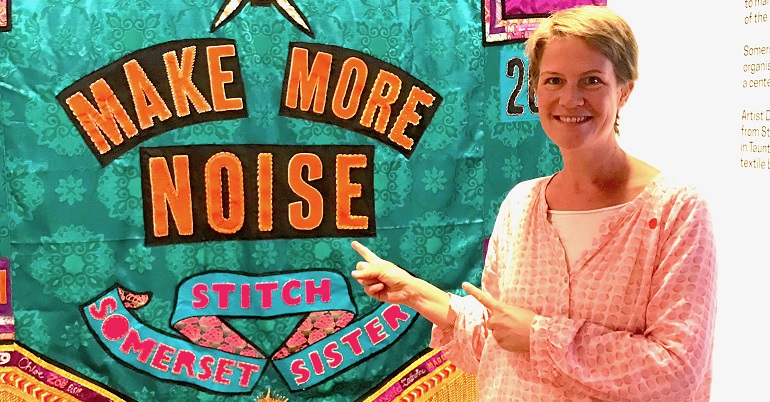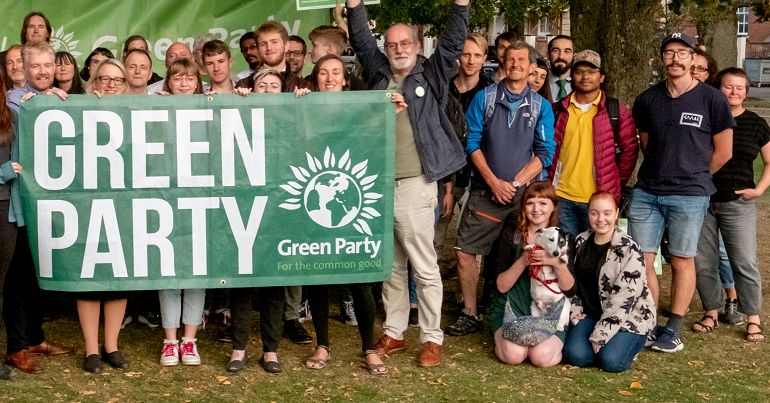Interview with Britta Goodman – GPEx campaigns coordinator candidate

Throughout August, members of the Green Party for England & Wales will be voting to elect members of the next Green Party Executive (GPEx). In all, members will vote to determine which representatives will carry out eleven different roles – including that of leader and deputy leader. There is also a ballot to determine who will be the party’s third member in the House of Lords should the party be asked to put forward another peer.
Incumbent campaigns coordinator Britta Goodman is restanding for for the role. This August, she’ll be going up against Hannah Graham and Daniel Laycock.
We asked each of the candidates five questions on their background and what they would seek to achieve on GPEx. Here are Britta’s responses:
What do you think are the main challenges currently facing the Green Party, and how would you work to overcome them?
The Green Party lacks profile. As a challenger party, we need strong messages to cut through.
To deliver, we must become more daring, deploying a wider diversity of spokespeople, and better connected with our regions.
Too much of our resources goes into central messaging. We must get more agile in tuning into campaigns across the country. Green Councillors are successfully driving Climate Emergency declarations and Green Recovery plans. We must get behind OUR big topics: Hinkley, Coal mines in Northumberland and Cumbria, fracking and airport expansion – raising our profile both locally and nationally.
We must empower every Green Party Member to offer positive alternatives to Boris Johnson’s Government. Our local and European elections success proves that people are open to our vision. But we must become more visible. For example, we have made too little use of our spokespeople; and why are we not giving our recent MEPs a greater platform? My observation from GPEx is the centre has tried so hard to find the one silver bullet message, that we have forgotten our strength grows from our diversity of local parties and activists.
What skills do you bring that would make you an effective member of the executive?
I have gained a very good understanding of our Party’s structures, essential for running decentralised campaigns. I worked my way up – from Campaign Officer in my local party (Hounslow), I was elected onto Campaigns Committee, then as GPEx Campaigns Co-ordinator for the past two years (in a job share with Caroline New). To understand exactly what is needed, we have visited regional conferences and local party meetings, developed our ideas with the Association of Green Councillors, consulted with individual Councillors, met some of the Green Party’s best campaigners and hosted four workshops at two Conferences.
It is incredibly important to take other people’s ideas and experiences on board. There is a very strong desire among our membership to (finally) campaign on the Climate Emergency. Campaigns need strategic targets, but it is always our members who are the main players. It is crucial to understand from the beginning on what they can and want to do, and what support is needed.
Over the past two years on GPEx, I have grown to become very patient. Some influential members of our Party see no place for issue-based campaigns at all, so there has been no meaningful campaigns budget or staff support. Fighting for resources, while convincing of the strategic case for climate campaigning has taken effort and nerve. Caro and I have laid the foundations, and I will now finish the job of reviving impactful campaigning across the party.
What campaigns have you been a part of that you can draw experience from in this position?
An eye opener was my first local campaigns, both trying to save parks. One campaign did everything right, the other one so many things wrong. One was successful, and the other was not. Comparing both made some key principles:
- Engage! With every single person. Make everyone feel welcome and valued.
- Form a group/community that welcomes every point of view. One might want to save the park for their kids, the next for their dogs (potential conflict) or the old trees, and the next just bears a grudge against the Council.
- Understand the way to victory. Is this just a local issue, or part of a bigger development picture? What is the solution? Fun events in the park, or regular gatherings of dogs and walkers at the Council? Signatures? Letters? Council meetings? Perhaps a law case…
The Preston New Road anti-fracking campaign is exemplary across the full spectrum: in-depth information about the fracking process, both radical (lorry climbing) and healing (women in white) events, broad outreach, and community building. Incredible determination and resilience!
The determination of XR to be both radical but peaceful impresses me. Nonviolent Direct Action is powerful and deep in Green Party culture but redefining the meaning of going to prison was genius.
We have a many experienced and outstanding campaigners in our Party. Let us finally ask them to help building our campaigning community.
What would you like to see the Green Party prioritising for its non-election campaigning?
Climate change! This is what a majority of our members want to see, and what the public expects us to lead on. We have the best policies, and significant successes to promote. Green Party Councillors across the country have driven Climate Emergency Declarations and Green Recovery Plans. The Action on Climate Emergency Campaign is ready to go.
One challenge offers opportunity: campaigning is the heart of the Green Party but has been neglected for many years. Our campaigning infrastructure has withered. We see success where determined individuals drive the agenda, but the centre must relearn how to empower local activists.
The call for greater diversity of voices runs as a common thread through these internal elections. To me, this means we are finally ready to open the stage. Campaigns are our outward-facing platform; the hub that displays our diversity.
Campaigns also attract younger people, drawing them into politics. Effective and inclusive campaigning will help to ensure the next generation of dedicated politicians can make a difference because they are a member of the Green Party.
What campaign groups or social movements would you like to see the Green Party working in collaboration or solidarity with?
Many. At the moment, we are constantly missing the train, not only on climate. We cannot keep piggybacking on campaigns that others have built through years of hard work. Even worse, we must not drop out again once they have served our purpose.
I know my way around climate change (FoE / Climate Action Network, Fridays for Future, XR, Climate Coalition, Campaign against Climate Change, anti-fracking, divestment etc.). We have many Members in these organisations, even in key positions, eager to work with us, if we get serious.
Boris Johnson´s Government will increase social injustice. We must be ready to campaign in the forefront. To be prepared, we must work closely with liberation groups, spokespeople and trade unions. We do have a hidden gem: our many Green Party members who are experts in fields such as Electoral Reform, NHS, Student Loans, Land Value Tax etc.
We need a Campaign Fest (modelled on the successful Policy Fest) to enable a flow of information, ideas and networking across campaign groups within the party.
This interview is part of a series with each of the candidates in this year’s GPEx elections. You can find Bright Green’s full coverage of the elections here.
PS. We hope you enjoyed this article. Bright Green has got big plans for the future to publish many more articles like this. You can help make that happen. Please donate to Bright Green now.



Leave a Reply